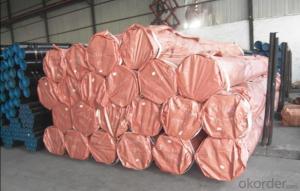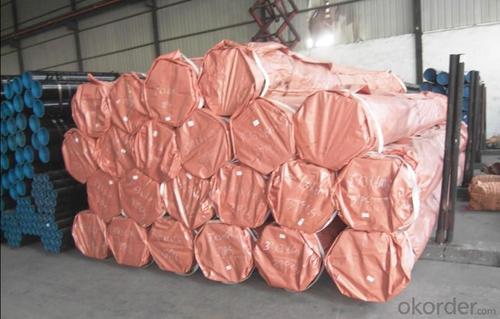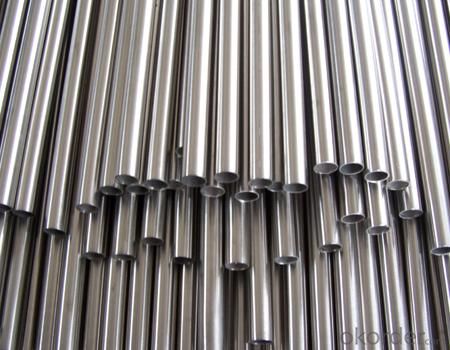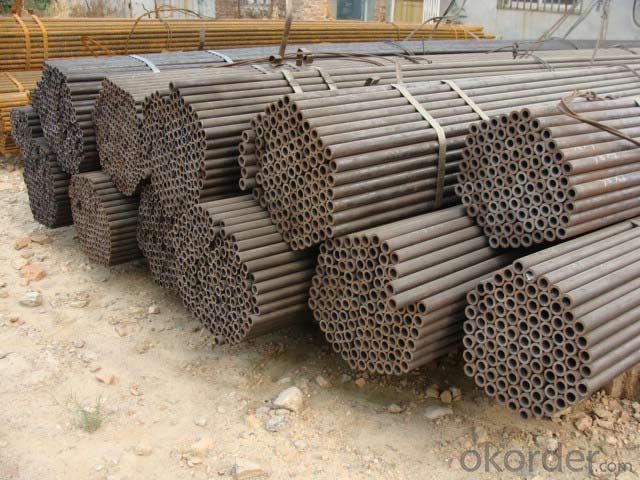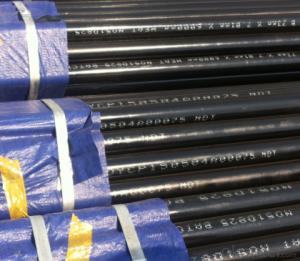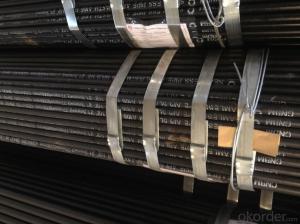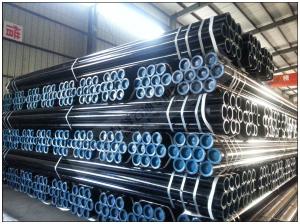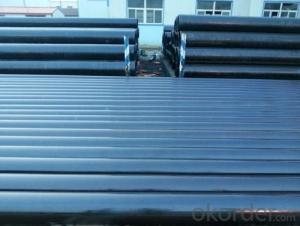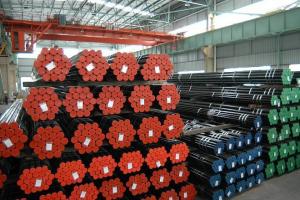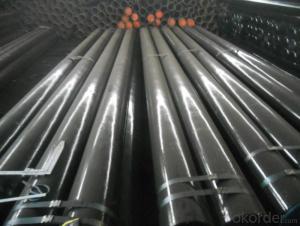Seamless Steel Pipe API 5L GRADE B
- Loading Port:
- China Main Port
- Payment Terms:
- TT or LC
- Min Order Qty:
- 25 m.t.
- Supply Capability:
- 60000 m.t./month
OKorder Service Pledge
OKorder Financial Service
You Might Also Like
1、Structure of Seamless Steel Pipe API 5L GRADE B:
Seamless pipe is formed by drawing a solid billet over a piercing rod to create the hollow shell. As the manufacturing process does not include any welding, seamless pipes are perceived to be stronger and more reliable. Historically seamless pipe was regarded as withstanding pressure better than other types, and was often more easily available than welded pipe.
2、Main Features of Seamless Steel Pipe API 5L GRADE B:
• High manufacturing accuracy
• High strength
• Small inertia resistance
• Strong heat dissipation ability
• Good visual effect
• Reasonable price
3、Seamless Steel Pipe API 5L GRADE B Specification:
Standard | GB, DIN, ASTM ASTM A106-2006, ASTM A53-2007 |
Grade | 10#-45#, 16Mn 10#, 20#, 45#, 16Mn |
Thickness | 8 - 33 mm |
Section Shape | Round |
Outer Diameter | 133 - 219 mm |
Place of Origin | Shandong, China (Mainland) |
Secondary Or Not | Non-secondary |
Application | Hydraulic Pipe |
Technique | Cold Drawn |
Certification | API |
Surface Treatment | factory state or painted black |
Special Pipe | API Pipe |
Alloy Or Not | Non-alloy |
Length | 5-12M |
Outer Diameter | 21.3-610mm |
Grade | 20#, 45#, Q345, API J55, API K55, API L80, API N80, API P110, A53B |
Standard | ASME, ASTM |
1) Material:20#(ASTM A 106/A53 GRB.API5LGRB,GB),45#,16Mn,10#.
2) Specification range:OD:21.3-610mm,WT:6-70mm,length:6-12m or according to the requirement of clients.
3) Excutive standards:GB,ASME API5L.ASTM A 106/A53,Despite of the above standards,we can also supply seamless steel pipe with standard of DIN,JIS,and so on,and also develop new products according to the requirements of our clients!
4) Surface:black lacquered,varnish coating or galvanized.
5) Ends:Beveled or square cut,plastic capped,painted.
6) Packing:bundles wrapped with strong steel strip,seaworthy packing.
4、Packaging & Delivery
Packaging Details: | seaworthy package,bundles wrapped with strong steel strip |
Delivery Detail: | 15-30days after received 30%TT |
5、FAQ of Seamless Steel Pipe API 5L GRADE B:
①How is the quality of your products?
Our products are manufactured strictly according to national and internaional standard, and we take a test
on every pipe before delivered out. If you want see our quality certifications and all kinds of testing report, please just ask us for it.
Guaranteed: If products’ quality don’t accord to discription as we give or the promise before you place order, we promise 100% refund.
②How about price?
Yes, we are factory and be able to give you lowest price below market one, and we have a policy that “ for saving time and absolutely honest business attitude, we quote as lowest as possible for any customer, and discount can be given according to quantity”,if you like bargain and factory price is not low enough as you think, just don’t waste your time.Please trust the quotation we would give you, it is professional one.
③Why should you chose us?
Chose happens because of quality, then price, We can give you both.Additionally, we can also offer professional products inquiry, products knowledge train(for agents), smooth goods delivery, exellent customer solution proposals.Our service formula: good quality+good price+good service=customer’s trust
SGS test is available, customer inspection before shipping is welcome, third party inspection is no problem.
6、Seamless Pipe ASTM A106/53 Images:
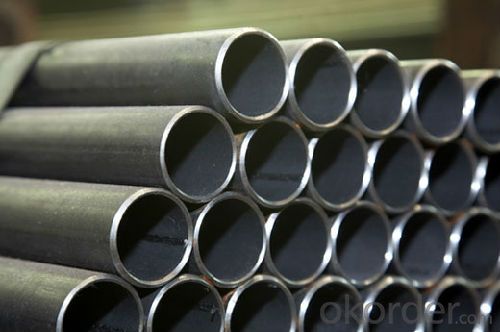
- Q: What is the difference between the stainless steel pipe welded pipe and seamless pipe?
- Grain size: usually, the grain size of the metal is related to the heat treatment temperature and the time at which the metal is kept at the same temperature. Therefore, the welded pipe and seamless tube annealing of the same grain size. If the minimum tube cold treatment, the grain size of the weld metal is smaller than the grain size, welding or grain size is the same.Strength: the strength of the pipeline in the composition of the alloy and alloy containing the same and the same heat treatment of seamless tube and seamed tube essentially consistent strength. After the tensile test and three-dimensional vibration test, tube tearing almost all occurred in the welding point or away from the heated area where. This is because there is little impurity in the weld and the nitrogen content is slightly higher, so the strength of the welded joint is better than that of other parts. However, the ASME Boiler and Pressure Vessel Association believes that the seamed tube can withstand 85% of the allowable pressure, which is mainly due to improved welding equipment data collection prior to today. The provisions of ASME 100% completely under license by ultrasonic testing pressure tube. Similarly, Europe and Asia also stipulates that can ensure the quality of welding performance by eddy current test tube, the eddy current testing is subject to legal procedures and licensed institutions. Trent's eddy current test was approved by the Swedish power division. ASME believes the current loss is relatively small, high-quality performance based on the seamed tube.
- Q: Can steel pipes be used for hydronic heating systems?
- Yes, steel pipes can be used for hydronic heating systems. Steel pipes are commonly used in hydronic heating systems due to their durability, strength, and ability to withstand high temperatures and pressures. They are also resistant to corrosion, making them suitable for long-term use in these systems.
- Q: How are steel pipes used in the textile industry?
- Steel pipes are commonly used in the textile industry for various applications such as conveying fluids, gases, and chemicals within the manufacturing process. They are used to transport hot water, steam, and air for heating and drying purposes, as well as to supply and distribute water and chemicals for dyeing and printing. Additionally, steel pipes are also utilized in the construction of textile machinery and equipment, providing support and structural integrity to the production line. Overall, steel pipes play a crucial role in ensuring the efficient and reliable operation of textile manufacturing processes.
- Q: Can steel pipes be used for fencing or railing?
- Yes, steel pipes can be used for fencing or railing. Steel pipes are durable, strong, and resistant to weather conditions, making them a suitable choice for fencing or railing applications. They provide stability and security while also offering an aesthetically pleasing appearance. Additionally, steel pipes can be easily customized and installed, making them a popular choice for fencing and railing projects.
- Q: What is the difference between hot-dip galvanizing and electroplating of steel pipes?
- Hot-dip galvanizing and electroplating are two different methods of applying a protective coating to steel pipes. Hot-dip galvanizing involves immersing the steel pipes in a bath of molten zinc, which creates a thick, durable coating that provides excellent corrosion protection. On the other hand, electroplating involves passing an electric current through a solution containing zinc ions, which causes the zinc to bond to the surface of the steel pipes. While electroplating can provide a thinner coating, it is generally less durable and may require additional layers or coatings for sufficient corrosion resistance.
- Q: How are steel pipes cleaned and flushed?
- Depending on specific requirements and conditions, different methods can be used to clean and flush steel pipes. One way to achieve this is through mechanical cleaning, which involves physically removing debris, rust, or scale from the inner surface of the pipes using wire brushes, scrapers, or other abrasive tools. This method is effective in removing loose or easily detachable contaminants. Chemical cleaning is another commonly used method, especially for pipes with stubborn deposits or rust. Various chemicals or cleaning agents are flushed through the pipes to dissolve or loosen the buildup, which can then be washed away. Acid-based solutions are often used for this purpose, but it's crucial to select the appropriate chemical and concentration to prevent pipe damage. High-pressure water jetting is an effective technique for cleaning and flushing steel pipes. Water is pumped at high pressure through a nozzle, generating a powerful jet that dislodges and removes debris or deposits from the pipe walls. This method is particularly useful for eliminating hard or compacted materials that are difficult to remove by other means. In some cases, a combination of these methods may be necessary to achieve the desired cleanliness. For example, mechanical tools can be used for pre-cleaning, followed by chemical cleaning or high-pressure water jetting to ensure thorough flushing and contaminant removal. Regular maintenance and cleaning of steel pipes are crucial to maintain efficiency and prevent corrosion. It's important to adhere to proper procedures and safety guidelines when cleaning and flushing steel pipes to achieve effective results and prevent any damage to the pipes.
- Q: What are the common sizes of steel pipe fittings?
- The common sizes of steel pipe fittings can vary depending on the specific application and industry standards. However, there are several standard sizes that are commonly used across different industries. These sizes range from ¼ inch to 48 inches in diameter. Some of the most common sizes include ½ inch, ¾ inch, 1 inch, 1 ¼ inch, 1 ½ inch, 2 inch, 2 ½ inch, 3 inch, 4 inch, 6 inch, 8 inch, 10 inch, 12 inch, 14 inch, 16 inch, 18 inch, 20 inch, 24 inch, 30 inch, 36 inch, 42 inch, and 48 inch. These sizes are often available in various lengths to accommodate different installation requirements. It is important to consult industry standards and specifications to determine the appropriate size of steel pipe fittings for a specific project.
- Q: Are steel pipes environmentally friendly?
- Steel pipes can be considered environmentally friendly due to their high durability and recyclability. Steel is a sustainable material that can be reused multiple times without losing its structural integrity. Additionally, steel pipes have low emission rates during production and can be coated to prevent corrosion, extending their lifespan. However, the environmental impact of steel pipes also depends on factors such as extraction of raw materials and energy consumption during manufacturing.
- Q: How do steel pipes handle chemical substances?
- Steel pipes are highly resistant to chemical substances due to their inherent strength and durability. They can effectively handle a wide range of chemical substances without corroding or degrading. Additionally, steel pipes can be further protected by coatings or linings to enhance their resistance to specific chemicals.
- Q: Can steel pipes be used for heat transfer applications?
- Yes, steel pipes can be used for heat transfer applications. Steel is a good conductor of heat, making it suitable for transferring heat from one place to another. Steel pipes are often used in various heat transfer systems, such as in heating, ventilation, and air conditioning (HVAC) systems, as well as in industrial applications where heat needs to be transported efficiently.
Send your message to us
Seamless Steel Pipe API 5L GRADE B
- Loading Port:
- China Main Port
- Payment Terms:
- TT or LC
- Min Order Qty:
- 25 m.t.
- Supply Capability:
- 60000 m.t./month
OKorder Service Pledge
OKorder Financial Service
Similar products
Hot products
Hot Searches
Related keywords
